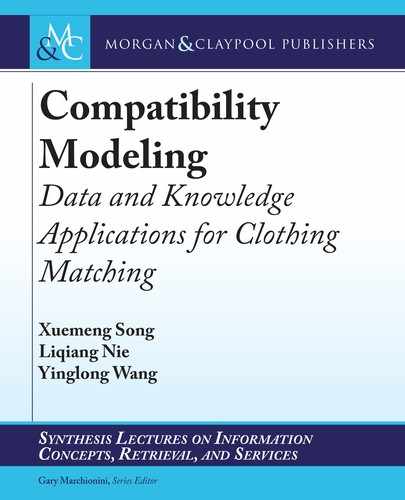
Series ISSN: 1947-945X
Compatibility
Modeling
Data and Knowledge
Applications for Clothing
Matching
Xuemeng Song
Liqiang Nie
Yinglong Wang
Series Editor: Gary Marchionini, University of North Carolina at Chapel Hill
Compatibility Modeling
Data and Knowledge Applications for Clothing Matching
Xuemeng Song, Shandong University
Liqiang Nie, Shandong University
Yinglong Wang, Qilu University of Technology
Nowadays, fashion has become an essential aspect of people’s daily life. As each outt usually comprises several complementary
items, such as a top, bottom, shoes, and accessories, a proper outt largely relies on the harmonious matching of these items.
Nevertheless, not everyone is good at outt composition, especially those who have a poor fashion aesthetic. Fortunately, in
recent years the number of online fashion-oriented communities, like IQON and Chictopia, as well as e-commerce sites, like
Amazon and eBay, has grown. e tremendous amount of real-world data regarding people’s various fashion behaviors has
opened a door to automatic clothing matching.
Despite its signicant value, compatibility modeling for clothing matching that assesses the compatibility score
for a given set of (equal or more than two) fashion items, e.g., a blouse and a skirt, yields tough challenges: (a) the absence
of comprehensive benchmark; (b) comprehensive compatibility modeling with the multi-modal feature variables is largely
untapped; (c) how to utilize the domain knowledge to guide the machine learning; (d) how to enhance the interpretability of
the compatibility modeling; and (e) how to model the user factor in the personalized compatibility modeling. ese challenges
have been largely unexplored to date.
In this book, we shed light on several state-of-the-art theories on compatibility modeling. In particular, to facilitate
the research, we rst build three large-scale benchmark datasets from dierent online fashion websites, including IQON
and Amazon. We then introduce a general data-driven compatibility modeling scheme based on advanced neural networks.
To make use of the abundant fashion domain knowledge, i.e., clothing matching rules, we next present a novel knowledge-
guided compatibility modeling framework. ereafter, to enhance the model interpretability, we put forward a prototype-
wise interpretable compatibility modeling approach. Following that, noticing the subjective aesthetics of users, we extend the
general compatibility modeling to the personalized version. Moreover, we further study the real-world problem of personalized
capsule wardrobe creation, aiming to generate a minimum collection of garments that is both compatible and suitable for the
user. Finally, we conclude the book and present future research directions, such as the generative compatibility modeling, virtual
try-on with arbitrary poses, and clothing generation.
store.morganclaypool.com
About SYNTHESIS
This volume is a printed version of a work that appears in the Synthesis
Digital Library of Engineering and Computer Science. Synthesis
books provide concise, original presentations of important research and
development topics, published quickly, in digital and print formats.
COMPATIBILITY MODELING
Series ISSN: 1947-945X
SONG • NIE • WANG
MORGAN & CLAYPOOL
Compatibility Modeling
Data and Knowledge Applications
for Clothing Matching

Synthesis Lectures on
Information Concepts,
Retrieval, and Services
Editor
Gary Marchionini, University of North Carolina, Chapel Hill
Synthesis Lectures on Information Concepts, Retrieval, and Services publishes short books on topics
pertaining to information science and applications of technology to information discovery,
production, distribution, and management. Potential topics include: data models, indexing theory
and algorithms, classification, information architecture, information economics, privacy and
identity, scholarly communication, bibliometrics and webometrics, personal information
management, human information behavior, digital libraries, archives and preservation, cultural
informatics, information retrieval evaluation, data fusion, relevance feedback, recommendation
systems, question answering, natural language processing for retrieval, text summarization,
multimedia retrieval, multilingual retrieval, and exploratory search.
Compatibility Modeling: Data and Knowledge Applications for Clothing Matching
Xuemeng Song, Liqiang Nie, and Yinglong Wang
2019
Video Structure Meaning
Brian O’Connor and Rich Anderson
2019
Interactive IR User Study Design, Evaluation, and Reporting
Jiqun Liu and Chirag Shah
2019
e Practice of Crowdsourcing
Omar Alonso
2019
Predicting Information Retrieval Performance
Robert M. Losee
2018
..................Content has been hidden....................
You can't read the all page of ebook, please click here login for view all page.
